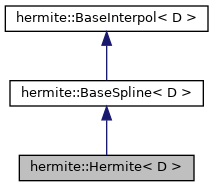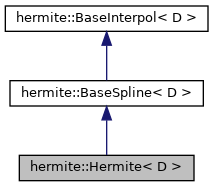#include <hermite.hpp>


Public Member Functions | |
| Hermite () | |
| Default constructor. More... | |
| Hermite (const double multiplier) | |
| Constructor. More... | |
| Hermite (const Hermite< D > &other) | |
| Copy constructor. | |
| Hermite< D > & | operator= (const Hermite< D > &other) |
| Assignment operator. More... | |
| ~Hermite () override=default | |
| Destructor. | |
| void | insert (const Pose< D > &waypoint) |
| Inserts a waypoint. More... | |
| void | replace (const Pose< D > &waypoint) |
| Replaces a waypoint. More... | |
| void | insertOrReplace (const Pose< D > &waypoint) |
| Inserts a waypoint if it doesn't exist, otherwise replaces the waypoint. More... | |
| bool | exists (const Pose< D > &waypoint) const |
| Checks if a waypoint exists. More... | |
| bool | exists (const double time) const |
| Checks if a waypoint at a certain time exists. More... | |
| void | erase (const Pose< D > &waypoint) |
| Removes a waypoint. More... | |
| void | erase (const double time) |
| Removes a waypoint. More... | |
| std::vector< Pose< D > > | getAllWaypoints () const |
| Gets a list of all waypoints. More... | |
| double | getLowestTime () const override |
| Gets the lower bound of the domain of the piecewise spline function, which is the first time (lowest t-value) listed in the waypoints. More... | |
| double | getHighestTime () const override |
| Gets the upper bound of the domain of the piecewise spline function, which is the last time (highest t-value) listed in the waypoints. More... | |
| Vector< D > | getPos (const double t) const override |
| Gets position at a certain time. More... | |
| Vector< D > | getVel (const double t) const override |
| Gets velocity at a certain time. More... | |
| Vector< D > | getAcc (const double t) const override |
| Gets acceleration of the function at a certain time. More... | |
| double | getLength (const double timeStep) const override |
| Gets arc length. More... | |
 Public Member Functions inherited from hermite::BaseSpline< D > Public Member Functions inherited from hermite::BaseSpline< D > | |
| virtual | ~BaseSpline ()=default |
| Destructor. | |
| double | getMaxDistance (const double timeStep) const |
| Gets maximum distance from origin. More... | |
| double | getMaxSpeed (const double timeStep) const |
| Gets maximum speed. More... | |
| double | getMaxAcceleration (const double timeStep) const |
| Gets maximum magnitude of acceleration. More... | |
 Public Member Functions inherited from hermite::BaseInterpol< D > Public Member Functions inherited from hermite::BaseInterpol< D > | |
| virtual | ~BaseInterpol ()=default |
| Destructor. | |
| virtual Vector< D > | operator() (const double t) const |
| Gets value of the interpolation function at a certain point. More... | |
Detailed Description
template<std::size_t D>
class hermite::Hermite< D >
Hermite spline class.
Given a set of poses (i.e. a desired position and velocity at a certain time), this class interpolates a path between these poses by using Hermite splines. It does this by interpolating a Hermite function between each pose using HermiteSub, and matching the final position and velocity of one pose with the initial position and velocity of the next.
This class can work with multiple dimensions, specified in the template argument. For example, if the path you want to interpolate is 2-dimensional, then specify "2" in the template argument.
This class acts like a std::map, where the key is the time. This is to ensure maximum efficiency inserting, removing, changing, and searching for the interpoloation equations. However, because time is a floating point number, and they are always imprecise, it needs to be converted into an integer. It does this by multiplying the time by a certain multiplier and truncating the rest of the digits. This is fine for most cases, as the time does not need to be super precise.
Hermite curves allow for fast local control, meaning that inserting and removing points is quick. However, it only provides C1 continuity, which means that there may be high jerk at knot points (as acceleration is discontinuous).
Constructor & Destructor Documentation
◆ Hermite() [1/2]
|
inline |
Default constructor.
Sets multiplier to 10, meaning that it shifts the decimal place of the given time by 1 digit before truncating the rest of the number whenever it is stored as a waypoint.
◆ Hermite() [2/2]
|
inline |
Constructor.
- Parameters
-
multiplier Multiplies the time given in the pose by the multiplier, then truncates the rest of the digits when storing the waypoint.
Member Function Documentation
◆ erase() [1/2]
|
inline |
Removes a waypoint.
- Parameters
-
time Time of waypoint to remove
- Note
- The waypoint's time is rounded by using the multplier
- If the waypoint's time is not precise enough, then this may erase a waypoint even though it might not be intended.
◆ erase() [2/2]
|
inline |
Removes a waypoint.
- Parameters
-
waypoint Waypoint to remove
- Note
- Only the waypoint's time is used in this method.
- The waypoint's time is rounded by using the multplier
- If the waypoint's time is not precise enough, then this may erase a waypoint even though it might not be intended.
◆ exists() [1/2]
|
inline |
Checks if a waypoint at a certain time exists.
- Parameters
-
time Checks if a waypoint exists at this time
- Returns
- If waypoint exists.
◆ exists() [2/2]
|
inline |
Checks if a waypoint exists.
- Parameters
-
waypoint Checks if this waypoint exists
- Note
- Only uses the time argument of the waypoint.
- Returns
- If waypoint exists.
◆ getAcc()
|
inlineoverridevirtual |
Gets acceleration of the function at a certain time.
- Note
- If time is outside the domain of time from the given points, then it calculates the value for the function whose domain is nearest to t.
- If number of waypoints is less than or equal to 1, then returns a zero vector.
- If called on a border between two functions, will take the value of the latter function.
- Parameters
-
t Time
- Returns
- Acceleration
Implements hermite::BaseSpline< D >.
◆ getAllWaypoints()
|
inline |
Gets a list of all waypoints.
- Returns
- A list of all waypoints, sorted in order of time.
◆ getHighestTime()
|
inlineoverridevirtual |
Gets the upper bound of the domain of the piecewise spline function, which is the last time (highest t-value) listed in the waypoints.
- Note
- If there are no waypoints, then returns 0
- Returns
- The last time measurement
Implements hermite::BaseSpline< D >.
◆ getLength()
|
inlineoverridevirtual |
Gets arc length.
- Parameters
-
timeStep The time step to try for the arc length
- Note
- This function will take much longer for smaller timesteps. Recommended is between 0.001 and 0.1, but this also depends on the domain of your function.
- If zero or one poses, returns 0.
- Returns
- Arc length
Implements hermite::BaseSpline< D >.
◆ getLowestTime()
|
inlineoverridevirtual |
Gets the lower bound of the domain of the piecewise spline function, which is the first time (lowest t-value) listed in the waypoints.
- Note
- If there are no waypoints, then returns 0
- Returns
- The first time measurement
Implements hermite::BaseSpline< D >.
◆ getPos()
|
inlineoverridevirtual |
Gets position at a certain time.
Same as calling operator()()
- Note
- If time is outside the domain of time from the given points, then it calculates the value for the function whose domain is nearest to t.
- If number of waypoints is less than or equal to 1, then returns a zero vector.
- Parameters
-
t Time
- Returns
- Position
Implements hermite::BaseSpline< D >.
◆ getVel()
|
inlineoverridevirtual |
Gets velocity at a certain time.
- Note
- If time is outside the domain of time from the given points, then it calculates the value for the function whose domain is nearest to t.
- If number of waypoints is less than or equal to 1, then returns a zero vector.
- Parameters
-
t Time
- Returns
- Velocity
Implements hermite::BaseSpline< D >.
◆ insert()
|
inline |
Inserts a waypoint.
- Parameters
-
waypoint Waypoint to insert
- Note
- If the waypoint's time exists (rounded according to the multiplier), then this method does nothing.
◆ insertOrReplace()
|
inline |
Inserts a waypoint if it doesn't exist, otherwise replaces the waypoint.
- Parameters
-
waypoint Waypoint to insert or replace
◆ operator=()
|
inline |
Assignment operator.
- Note
- All data stored in current Hermite object will be lost.
◆ replace()
|
inline |
Replaces a waypoint.
- Parameters
-
waypoint Waypoint to replace
- Note
- Gets the time from the waypoint.
- If the waypoint does not exist, then this method does not change anything.
The documentation for this class was generated from the following file:
- /home/runner/work/hermite/hermite/include/hermite/hermite.hpp